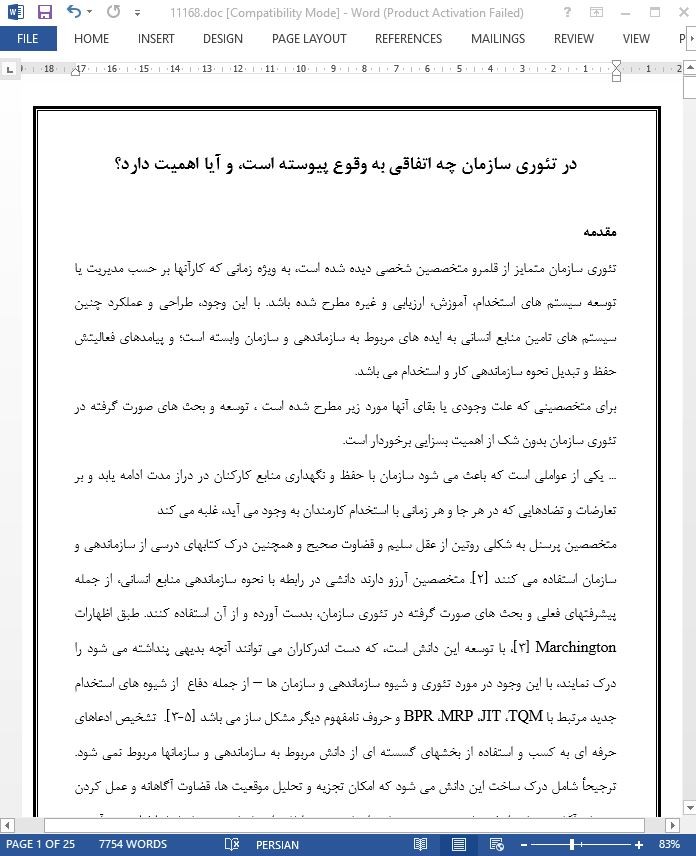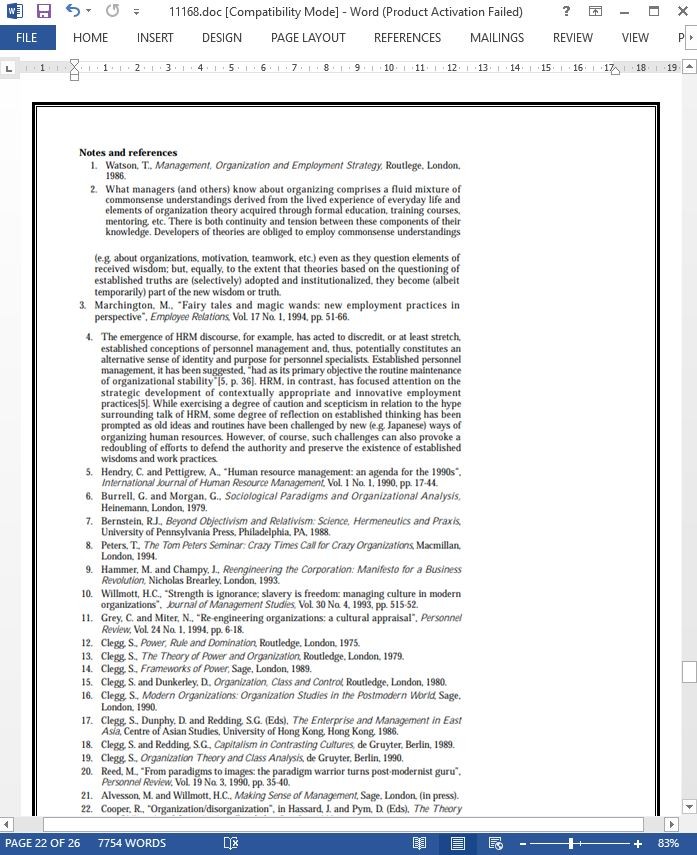
در تئوری سازمان چه اتفاقی به وقوع پیوسته است، و آیا اهمیت دارد؟
مقدمه
تئوری سازمان متمایز از قلمرو متخصصین شخصی دیده شده است، به ویژه زمانی که کارآنها بر حسب مدیریت یا توسعه سیستم های استخدام، آموزش، ارزیابی و غیره مطرح شده باشد. با این وجود، طراحی و عملکرد چنین سیستم های تامین منابع انسانی به ایده های مربوط به سازماندهی و سازمان وابسته است؛ و پیامدهای فعالیتش حفظ و تبدیل نحوه سازماندهی کار و استخدام می باشد.
برای متخصصینی که علت وجودی یا بقای آنها مورد زیر مطرح شده است ، توسعه و بحث های صورت گرفته در تئوری سازمان بدون شک از اهمیت بسزایی برخوردار است.
... یکی از عواملی است که باعث می شود سازمان با حفظ و نگهداری منابع کارکنان در دراز مدت ادامه یابد و بر تعارضات و تضادهایی که در هر جا و هر زمانی با استخدام کارمندان به وجود می آید، غلبه می کند
ملاحظات پایانی
با انتخاب کار Clegg به عنوان نقطه کانونی، این مقاله به کشف انتقادی تفکر جدید راجع به سازماندهی وسازمانها پرداخت. این تفکر به نقش مهم معنا و قدرت در سازمانها توجه کرده است. ابتدا، خصوصیات معنا و قدرت از ساختاربندی روابط اجتماعی، از جمله روابط استخدام برحسب کلاس و جنسیت بدست آمدند. سپس این کمبود حداقل در مورد کلاس، به خرج و هزینه درک وساطت این روابط به وسیله چارچوب های نهادی، تصحیح گردید که معنای این روابط را تفسیر و ارزیابی می کنند. در کتاب سازمانهای مدرن [16]، نقش کلیدی این چارچوب ها تشخیص داده شده است، اما به نحوه سازماندهی و حاکمیت روابط استخدام با دستور انباشت سرمایه نگاه نشده است.
Introduction
Organization theory can seem somewhat distant from the territory of personnel specialists, especially when their work is represented in terms of administering or developing systems of recruitment, training, appraisal, etc. Yet, on reflection, the design and operation of such “human resourcing” systems is dependent on ideas about organizing and organization; and their operation has consequences for the maintenance and transformation of how work and employment are organized.
Developments and debates in organizational theory are, arguably, of considerable relevance for personnel specialists whose raison d’être, it has been suggested,
is one of keeping the organization as a whole going on a long-term basis through maintaining the staffing resource and coping with the conflicts and contradictions which arise wherever and whenever people are employed[1, p. 154].
Concluding remarks
Taking Clegg’s work as its focal point, this article has provided a critical exploration of new thinking about organizing and organizations. This thinking has drawn attention to the central role of meaning and power in organizations. Initially, the constitution of meaning and power was abstracted from the structuring of social relations, including employment relations, by class and gender. This deficiency was then corrected, at least in respect of class, at the expense of an appreciation of how these relations are always mediated by institutional frameworks which serve to interpret and evaluate the meaning of these relations. In Modern Organizations[16], the key role of these frameworks is recognized but sight is lost of how employment relations are organized and governed, first and foremost, by the imperative of capital accumulation.
مقدمه
پیشرفت های صورت گرفته در تئوری سازمان
انفجار نظریه پردازی
ورود تفکر پست مدرن
از کهنه سرباز آزادی بخش تا خبرخوان پست مدرن
توقف انعکاس انتقادی
مسئله حقیقت بیجان (آنتولوژی)
مسئله اخلاقی- سیاسی
شرایط متناقض تمایز زدایی پست مدرن
ملاحظات پایانی
Introduction
Developments in organization theory
An explosion of theorizing
The arrival of things postmodern
From emancipatory warrior to postmodern newshound
Critical reflection suspended
The brute facts issue (ontology)
The ethico-political issue
The contradictory conditions of postmodern de-differentiation
Concluding remarks
- اصل مقاله انگلیسی با فرمت ورد (word) با قابلیت ویرایش
- ترجمه فارسی مقاله با فرمت ورد (word) با قابلیت ویرایش، بدون آرم سایت ای ترجمه
- ترجمه فارسی مقاله با فرمت pdf، بدون آرم سایت ای ترجمه


